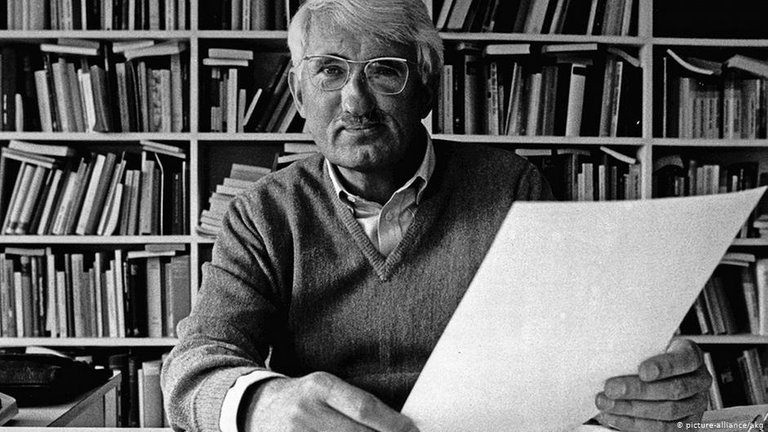
One strength of democracies, according to many of its proponents, is the creation of ‘the public sphere’ in which people are allowed to discuss their political views openly.
Jürgen Habermas
The philosopher, Habermas (1964), calls the public sphere
a realm of our social life in which something approaching public opinion can be formed.
All citizens are guaranteed the freedom to access the public sphere, the freedom of assembly and association and the freedom of expression. The goal of the public sphere is to foster peaceful discussion between all people including those who hold conflicting political ideas so that people with conflicting ideas can reach mutual understanding. It is assumed that through reason and argumentation, even the opposing minority has the chance to convince the general public for a change in political course.
Jürgen Habermas
Karl Popper
According to the philosopher Karl Popper (1963), the public sphere therefore provides the opportunity for regime change without violence. The most important characteristic of a public sphere in my opinion is that it safeguards freedom of thought and that it encourages rational discussions. These are important liberal values that play a quintessential role in the quest for truth.
Popper writes that our search for truth is based on the following three principles:
- The principle of fallibility;
- The principle of rational discussion;
- The principle of approximation to the truth.
He asserts that we should be epistemologically modest and that we, like Socrates, should know that we know very little. The principle of fallibility stresses the importance of being epistemologically modest, because it maintains that there is a possibility that our intellectual convictions are wrong. For this reason, every theory should be subject to rational criticism: instead of desiring to prove our theories, we should therefore train ourselves to criticize them. Even if we do not reach an agreement in a discussion, there is still much we can learn from the discussion. It may for example have shed some light on our intellectual errors or it may provoke a deeper understanding on some parts which hence brings us closer to the truth.
Karl Popper
Conclusion
Discussions in the public sphere are important as they can generate new insights and theories in political philosophy. The public sphere can be considered as a public space where knowledge is generated through peaceful discussion. This, of course, requires freedom of speech.
References
Habermas, J. (1964). The Public Sphere: An Encyclopedia Article.
Popper, K. (1963). Conjectures and Refutations.
Karl Popper, maybe my favorite philosopher
A very nice blog!
Thanks! :)
steemit - virtual public sphere
Yes, a place without censorship. :)
Nice article
Thanks Lem! :)
From what I see there is seldom ever place for peaceful discusions in public spheres. Almost everyone has his/hers own ideas and won't open up for reasonable conversatios because he or she will think this way demonstrates weakness. That's a sad truth.
Yeah, many people don't have the spirit for peaceful open discussions. That's sad indeed.
Great article. We should all be concerned with the current trend of not allowing debate and discourse from being had just because it might offend someone. The ability to freely and openly express oneself is the very backbone of our society and it is under attack from all sides.
Thanks! I'm also concerned about that. I totally agree with you that it's under attack from all sides and that freedom of expression and debate is the very backbone of our society. Just the other day, I wrote this down this note:
Good read! Steem on friend!
Yes, Steem on!
Thanks man! I appreciate your comment.
Thanks, Bilal. :)